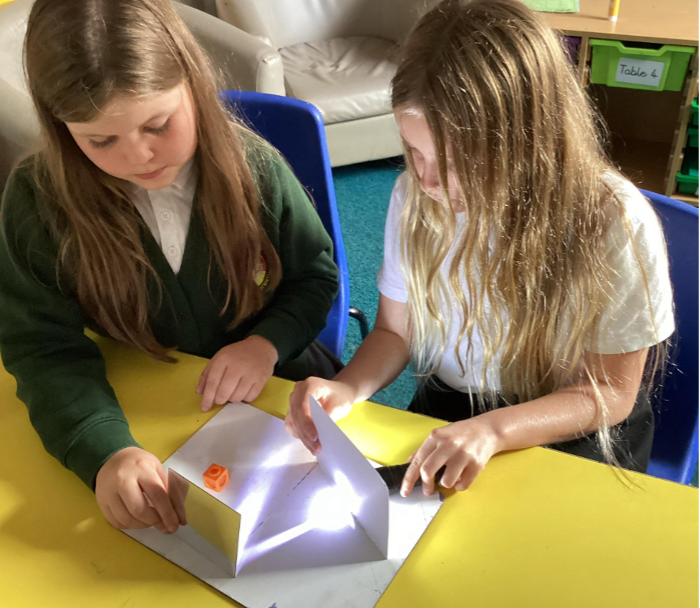Science
Our Science curriculum for KS1-KS2 follows four main themes: Earth Sciences, Chemistry, Biology and Physics.


ABOUT THIS CURRICULUM
Science at Eden Park
At Eden Park, we offer a high-quality, well-rounded science curriculum that encourages children to explore, question, and understand the world around them. Our aim is to deepen children’s knowledge of how things work while fostering respect for living organisms and the environment.
We want pupils to view science as exciting, enjoyable, and relevant to everyday life. By developing key skills and scientific understanding, we prepare them to thrive in an ever-changing world.
Through hands-on, investigative learning, we nurture curiosity, creativity, and problem-solving skills. Children are encouraged to dream big — whether they aspire to be astronauts, vets, or marine biologists, we support their ambitions with practical, engaging experiences that build knowledge and inspire a lifelong love of science.
Science is taught in line with the National Curriculum through themed topic weeks. Our ‘voices’ framework ensures pupils develop core scientific thinking skills each year, with strong links to prior and future learning.
Lessons are built around recurring themes in biology, chemistry, physics, and earth sciences, with clear knowledge and vocabulary goals. For those with a special interest in science, our 'Science Graduate' programme offers enrichment beyond the curriculum, exploring the impact of influential scientific figures.
Science in Early Years Foundation Stage (EYFS)
In Early Years, children are introduced to science through the Understanding the World area of learning. They use their senses to explore a range of materials and begin to make sense of the physical world, including natural phenomena. Through hands-on experiences, they observe plants and animals, start identifying key features, and develop early skills in exploration and problem-solving.
Daily discussions about weather and seasons lay the groundwork for Year 1 science, where this knowledge is extended through fieldwork. The EYFS curriculum is carefully designed to create strong foundations in scientific understanding, which are built upon throughout KS1.
Children engage in rich, practical activities such as observing tadpoles to learn about life cycles, comparing vegetables, planting seeds in different conditions, and experimenting with water and sand to explore size, weight, and capacity. These experiences foster curiosity and introduce core scientific skills in a meaningful, age-appropriate way.
Key Stage One (Years 1 and 2)
Children develop their scientific understanding through a variety of engaging topics. In biology, they identify common plants and trees, learn about seed growth, and explore animals like fish and reptiles, using terms such as carnivore, herbivore, and omnivore. They also observe how young animals grow and develop, label human body diagrams, investigate the senses, and understand basic health needs. In chemistry, children identify and describe everyday materials, compare their uses, and experiment with changing shapes. In physics, they explore light and dark, discover light sources, and investigate sound, including pitch and volume. In earth sciences, children observe seasonal changes and weather patterns throughout the year, study habitats, and learn how animals adapt to their environments, while also discussing simple food chains.
Key Stage Two (Years 3 to 6)
As children progress through the science curriculum, they deepen their understanding across a wide range of topics. In biology, they explore the functions of plant parts, life cycles, and how plants sustain life. They learn about animal nutrition, skeletons, muscles, major organs, and the human digestive and circulatory systems, including the impact of diet and exercise. They also study the human life cycle, food chains, and the processes of reproduction in some plants and animals. Living things are grouped and classified, with a focus on how environments influence behaviour and characteristics.
In chemistry, children investigate different types of rocks and fossils, understand the states of matter—solids, liquids, and gases—and observe changes such as melting, evaporating, and dissolving. They explore reversible and irreversible changes in materials. In physics, they study light by exploring how shadows form, how light travels, and how we see objects. Sound is examined through vibration, pitch, and volume. Children also explore forces and magnets, learning about friction, air and water resistance, and how pulleys and levers affect force. In electricity, they construct simple circuits using lamps, motors, and switches, understanding how performance changes with the number of cells used.
Finally, in Earth and space science, children describe the movement of the Earth, moon, and planets relative to the sun, gaining a clearer picture of our solar system and its dynamics.
Enriching Science
A highlight of our science program is the half-termly Science Weeks. These immersive events provide students with opportunities to engage in practical experiments, explore scientific concepts, and interact with professionals in the field. By participating in activities such as building models, conducting investigations, and presenting findings, pupils develop critical thinking and problem-solving skills. These weeks not only reinforce classroom learning but also inspire students to envision themselves in various scientific roles, from marine biologists to engineers.
Through these enriching experiences, Eden Park fosters a lifelong love for science, encouraging students to question, explore, and understand the ever-changing world around them. Our commitment to providing a dynamic and inclusive science education ensures that every child is equipped with the knowledge and skills to thrive in the future.







